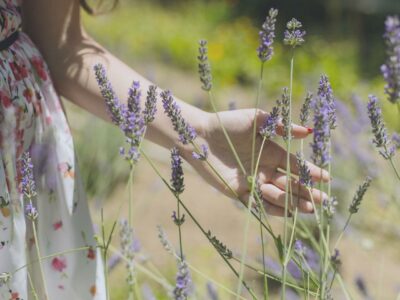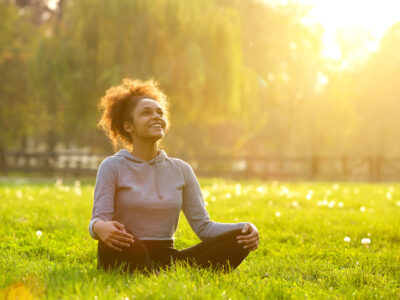Almost everyone experiences sleep issues at some point…
It feels as though you’ve barely closed your eyes, and bam! Your morning alarm goes off.
Or even worse, you drift into a deep slumber but wake up just a few hours later, with racing thoughts making it impossible for you to fall back asleep.
It makes getting the recommended 7-9 hours of sleep feel like an unattainable goal.
Luckily, there are gentle, all-natural solutions for falling asleep and staying asleep.
Let’s explore the most effective natural sleep aids for enhancing the quality and quantity of your sleep.
The Best Natural Sleep Aids
Ready to get a full night of zzzz’s, the way Mother Nature intended?
Feeling well-rested and getting a good night’s sleep depends on 3 things:
- Falling asleep easily
- Staying asleep
- Sleeping until morning
Here are the natural sleeping aids that can help make that happen.
Take a Melatonin Supplement
Even if you’re not well-versed in the science of sleep, you’ve probably heard of melatonin. Its common usage and household popularity are a testament to its well-earned reputation as the best natural sleep aid.
Melatonin is a naturally occurring hormone that synchronizes your body’s circadian rhythm, also known as your sleep-wake cycle.
Your body’s production of melatonin lowers during the day and increases in the evening. When your melatonin levels rise, it sends a signal to your body that it’s getting late and that you should be going to sleep soon.
Your natural melatonin level can decrease due to illness, medications, mood disorders, and aging.
A melatonin supplement can help increase your melatonin level, helping you sleep longer and more deeply.
Drink Valerian Root Tea
Along with melatonin, your body produces another chemical that can positively affect your sleep.
Gamma-aminobutyric acid (GABA) is an inhibitory neurotransmitter, meaning it can stop or block messages being created, delivered, or received by your nervous system.
Higher levels of GABA have a calming effect on your brain and can help dispel anxiety, stress or fear—any of which can be causing your sleeplessness, even if you don’t realize it.
Research suggests that valerian root can raise your GABA level, thus improving your sleep.
A warm cup of valerian root tea 1-2 hours before bedtime is most effective, although it can take a few weeks for you to feel its sleep-promoting effects.
Sip Kava Kava
Kava kava (or just kava) is a drink, supplement, or extract made from the Piper methysticum plant. It is commonly used in social settings and ceremonies in the Pacific Islands.
Kava is known for its relaxing effects, making users feel calm, happy, and at ease. Physically, it can also help you unwind, relaxing muscles, releasing tension, and relieving pain.
Because of its soothing effects, kava is often used to treat anxiety, stress, and insomnia.
However, prolonged kava use can also have a negative impact on your liver, posing a serious health risk compared to similar all-natural sleep aids, so it’s probably best to only use it from time to time.
Related
9 Herbs For A Stress-Free Life
The secret to living a life that’s happy and stress-free lies in these nine herbs! Keep reading to find out more. Enjoy a Stress-Free Life with These Herbs 1. Ashwagandha If you’re looking for a way to make life more stress-free, you can begin with Ashwagandha. This is one of the most powerful herbs in …
Inhale or Drink Chamomile
Chamomile is an herb, often mistaken for a flower, that belongs to the same family as daisies. It has been used for thousands of years to provide calm, relieve muscle tension, reduce anxiety, and treat insomnia.
More recent studies show that chamomile can significantly improve quality sleep, especially among the older population.
One of the most common ways to consume chamomile is in a warm mug of chamomile tea, which can also be part of a cozy, sleep-inducing evening ritual.
If you’re not a fan of chamomile tea, or tea in general, you can also use chamomile in its oil form. You can diffuse it, apply it to your skin, apply it to your bath, or mix it with water and spray it on your sheets.
Surround Yourself with Lavender
Lavender is a distinctive, eye-catching purple shrub, commonly known to be relaxing.
Studies show that inhaling lavender can help you achieve better sleep, as its soothing scent has been shown to reduce anxiety and calm the nervous system.
Here are some ways to immerse yourself in this calming scent, using a quality lavender essential oil.
- Use lavender oil in an aromatherapy diffuser.
- Add a few drops of lavender oil to your bathwater.
- Apply lavender scented lotion or (diluted) lavender oil to your skin.
- Fill a spray bottle with water, add a few drops of lavender oil, and spray it on your bedding.
You can also drink lavender tea, either store bought or from homegrown lavender.
Eat More Tryptophan
The post-dinner nap is almost as traditional as Thanksgiving dinner itself, thanks to tryptophan.
Tryptophan is an amino acid that acts as a building block for serotonin, which is then converted to sleep-regulating melatonin. It’s produced by your body, but can also be found in certain food and drinks—including, that’s right, turkey.
Several studies have shown that increasing your supply of tryptophan, through dietary choices, can raise your melatonin levels and help improve the quality of your sleep.
Tryptophan-rich foods include:
- Beef
- Cheese, including mozzarella and cheddar
- Chia seeds
- Chicken
- Eggs
- Fish and seafood
- Milk
- Oats
- Peanuts
- Pork
- Quinoa
- Pumpkin seeds
- Soybeans
- Sunflower seeds
- Tofu
- Turkey
- Yogurt
Get Enough Magnesium
Magnesium is a mineral with sedative properties. It’s found in food, drinks, and supplements.
Researchers believe that magnesium can help you achieve better sleep in three different ways.
- Elevating your melatonin level
- Relaxing your muscles
Magnesium also influences the benzodiazepine receptor, the same one used anxiety medications (such as Valium) and sleep medications (such as Ambien). By quieting your nervous system, magnesium allows you to relax and fall into a deep, untroubled sleep.
To get more magnesium in your diet, consume these foods.
- Almonds
- Avocados
- Bananas
- Black beans
- Brown rice
- Cashews
- Dark chocolate
- Edamame
- Fortified breakfast cereal
- Halibut
- Oatmeal
- Peanuts and peanut butter
- Pumpkin seeds
- Salmon
- Soy milk
- Spinach
- Whole wheat bread
- Whole milk
- Yogurt
Magnesium supplements can also be effective sleep aids, as studies show that they help improve sleep disorders, particularly among the elderly.
Related
What Is Magnesium Good for in Your Body?
Learn more about magnesium benefits, sources, signs of deficiency, and more in this article.
Try Cannabidiol (CBD)
Cannabidiol, more commonly referred to as CBD, is derived from hemp plants. CBD is non-impairing, meaning it doesn’t give users any sort of “high” or altered state, but it is a known nootropic thanks to its cognitive benefits.
Studies show that CBD can offer sleep benefits, helping you fall asleep quicker and sleep more deeply.
This goes hand in hand with other CBD research, which shows that CBD reduces anxiety. By calming your racing thoughts, CBD makes it easier for you to unwind in the evening and sleep better at night.
CBD comes in several forms, including tinctures, topical creams/lotions, liquids, capsules, and gummies. You can choose the form that’s most convenient for you, and use it as part of your pre-bedtime routine.
Take a Spore-Based Probiotic
Probiotics support the beneficial bacteria in your gut microbiome, which regulate many of your body’s functions. This includes getting a good night’s sleep by supporting your natural circadian rhythm and melatonin production.
Studies show that taking a quality probiotic can help your body produce an optimal amount of melatonin and increase your overall sleep quality.
But not just any probiotic will do! Some are more effective than others, specifically you want to choose a spore-based probiotic. Our favorite is Just Thrive Probiotic. Thanks to its protective endospore shell, it has a 100% survivability rate and arrives in your gut ready to get to work. Once in your gut, it supports the colonies of beneficial bacteria, so they can help you achieve the quality sleep you need.
More Sleep Strategies
Having an effective “sleep plan” can also promote a full night of quality sleep.
In addition to these natural sleep aids, here are some of our top strategies to help you fall asleep and stay asleep.
Relax Your Mind (and Body)
When your mind is relaxed and at ease, so is your body. The release of physical and emotional tensions can help you fall asleep faster and sleep longer.
These are some of the best ways to unwind and relax before bedtime.
- Do light stretching, yoga, or tai chi.
- Practice meditation or deep breathing exercises.
- Take a warm, relaxing shower or bath.
- Use aromatherapy oils, diffusers, or candles (be sure these only use natural oils and no artificial fragrances) with relaxing scents, such as lavender, clary sage, bergamot, or sandalwood.
- Play relaxing music or soft nature sounds.
Create a Sleep Environment
Creating a sleep-conducive environment can improve both the quality and quantity of your sleep.
Here are some ways to turn your bedroom into a calm, soothing sleep sanctuary.
- Cover windows with blackout curtains or blinds.
- Eliminate digital distractions/noise by removing electronics from your bedroom.
- Drop the temperature! Studies show that 60 to 67° F is the ideal sleep temperature for most people, although this can vary from person to person.
Turn Off Electronics Early
Electronics can wreak havoc on your sleep, and it’s not just because of endless scrolling or Netflix binges.
The blue light emitted by back-lit devices such as cell phones, laptops, tablets, and televisions reduces or delays your body’s production of melatonin and disrupts your natural sleep rhythm.
Turn off electronics well before bedtime and spend the end of your evening doing something relaxing offline, instead.
Establish a Nightly Routine
Creating a nightly routine can signal to your body that it’s time for sleep. It’s why bedtime routines for children are so common—and so effective.
Use some of our suggestions above as inspiration. Maybe it’s a bath and a book, or maybe it’s listening to music while you stretch.
Once you’ve figured out what helps you relax and settle down, commit to doing it every night before bed.
Final Thoughts
Sleep troubles are no fun! When you’re having trouble falling asleep, waking up during the night, or not sleeping long enough, the results can be emotionally, mentally, and physically taxing.
But you can turn that around and sleep soundly with all-natural sleep aids.
Explore some of these natural sleep aids and take steps to create a healthy sleep environment, and you’ll be drifting off to dreamy bliss in no time.
You May Also Like…
The post The Best Natural Sleep Aids to Fall Asleep and Stay Asleep appeared first on Well.Org.





